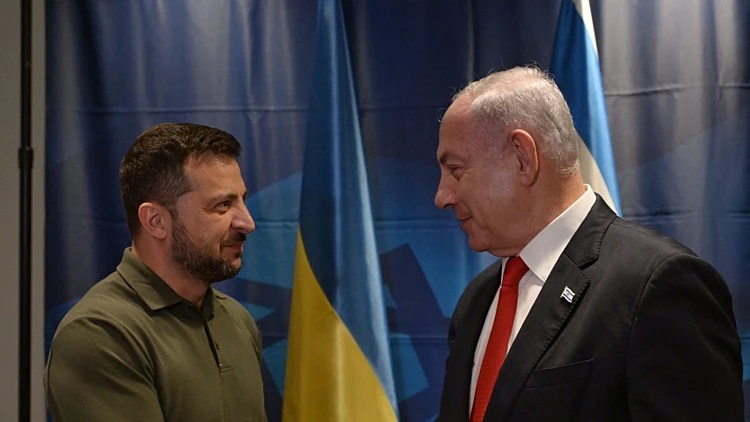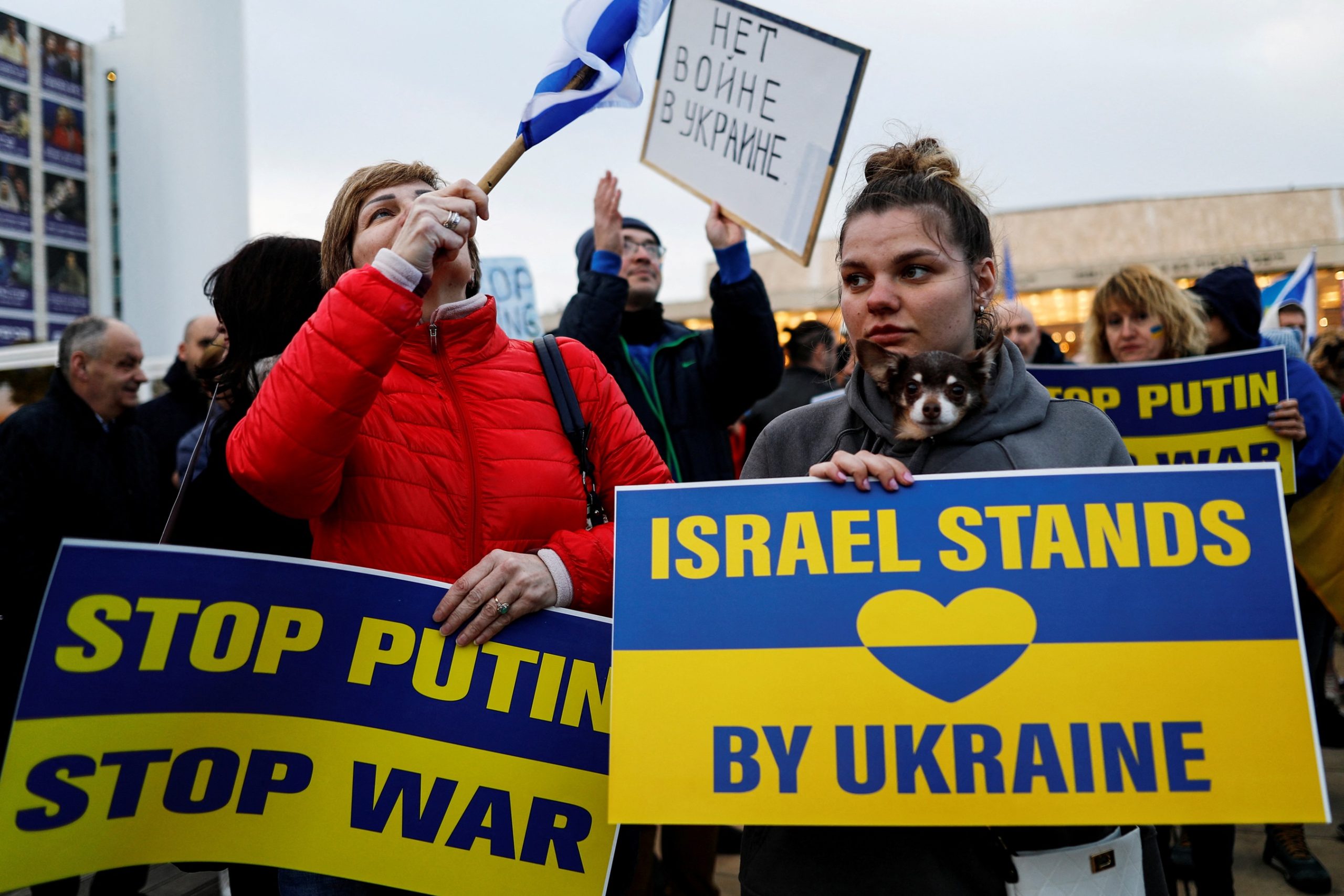Publications
INSS Insight No. 1808, January 3, 2024
Israel’s position regarding the war in Ukraine represents an ongoing dilemma, in part due to the connection that the US administration sees between the Israel-Hamas war and Ukraine’s confrontation with Russia, as well as Washington’s efforts to provide economic and military aid to both Israel and Ukraine. Israel’s neutral position on the war in Ukraine, in face of the longstanding pro-Palestinian position that Moscow has taken, signals to Russia that it can continue to ignore Israeli interests, and at the same time, does not help the United States help Israel. Thus, there is a need to reexamine Israel’s position vis-à-vis Russia.
Since the outbreak of the war in Gaza, the question of a possible change in Israel’s position on the Russia/Ukraine issue has remained highly relevant. At the current time, it may seem that Israel is missing the optimal momentum to change course and take a more openly pro-Ukraine position.
Russia’s aggressive discourse about Israel may have moderated somewhat since the first weeks of the war; it was due to Moscow’s support of Hamas that the organization agreed to free three hostages with dual Israeli-Russian nationality (even though two of them were also freed as part of a hostage-prisoner exchange deal with Israel). For its part, Jerusalem adjusted its policy toward Russia (which has adopted a clear pro-Hamas position since the outbreak of the war) in a quite minor manner. Practically, it was implemented by relating messages through bilateral channels, rebuffing criticism over war efforts at the United Nations, and with very few public confrontations. Notably, Israel refrained from touching on issues relating to Ukraine.
Regarding Ukraine, Kyiv has voiced nothing but political and public support for Israel since the war began. Yet there have been fewer pro-Israel voices heard of late, because of the increasingly difficult nature of the fighting against Russia, increased uncertainty over the continued supply of arms and ammunition from the United States, and domestic political disputes. Moreover, a planned visit by Ukrainian President Volodymyr Zelenskyy to Israel did not occur.
Against this backdrop, one could ostensibly argue that the most apt moment to recalibrate Israel’s position on the Russia-Ukraine war has already passed, and now the “business as usual” approach has been restored in both countries. Having said that, there are two additional factors that must be considered in this equation: the United States and Russian strategy on the international stage.
The war in Gaza is changing the Western perspective of Ukraine – primarily the American perspective – in a manner that benefits Russia. Moscow is keen for the conflict between Israel and Hamas to continue, since that would wear down the United States, which, at the moment, is hard pressed to determine its policy on both fronts. As a result of disputes in Congress, the planned aid to Jerusalem and Kyiv is currently on hold. Some American lawmakers view the Israel-Hamas war and the Russia-Ukraine conflict as two separate issues that have no direct link between them (which weakens the White House claim that it is both urgent and vital that both aid packages are approved), in part because Israel is not placing itself in the Western pro-Ukrainian context.
Immediately after his visit to Israel, US President Joe Biden described both conflicts in terms of acts of aggression committed by anti-democratic Russia and Hamas against their democratic neighbors. Similar sentiments were expressed by Zelenskyy and Ursula von der Leyen, the President of the European Commission. Given most Republican lawmakers’ unreserved support for Israel, the administration hoped to get their approval for a joint aid package for Israel and Ukraine. There were, however, two main reasons that this plan failed: a dramatic drop in support among the American public for continued aid to Ukraine, due to the prevalent view that the war has reached an impasse; and the fact that overseas aid has become one of the main issues in the power struggle between the two parties, against the backdrop of increased tension in advance of the 2024 presidential election. American lawmakers want to support Israel and, to a lesser extent, Ukraine, but the sense of emergency that existed in 2022 has diminished. These differences of opinion harm the standing of Ukraine among the American public. More problematic is the significant reduction in the scope of the aid, as appears likely following the Congressional compromise reached (compared to the original proposal put forward by the Biden administration, which stood at $61 billion), which will make it even harder for Ukraine to continue the war against Russia.
Israel has not officially responded in any way to the equation that President Biden presented that compared the two conflicts and has had very little to say about the aid package issue. This aid is not as urgent for Israel as it is for Ukraine, and there is a sense in Jerusalem that pro-Israel officials will, in the end, manage to ensure that the aid package is approved. The fact that Israel totally ignored the equation that the administration sought to promote between the two wars no doubt harmed efforts to approve the aid package and may even have bolstered the impression that Israel has no interest in aligning itself with the pro-Ukrainian bloc in the West. In other words, instead of expressing even a minimal amount of solidarity with a US administration that is supportive of and friendly toward it, Israel opted to maintain its neutrality on the Russia-Ukraine war.

Alongside the Western approach, there is another factor that has influenced the trilateral relationship between Russia, Israel, and Ukraine: Moscow’s overall strategy and what that could mean for Israel. As has been amply evident since October 7, and as a result of the boycotts and sanctions imposed on it, Russia has sought to expand the support by countries from the Global South. Most of these countries – including the vast majority of Muslim countries – have very strong pro-Palestinian policies, which dictate the position that Moscow must take in the Israel-Hamas war. As long as there is no resolution to the conflict between Russia and the Western, pro-Ukraine bloc (and there is no indication that hostilities will end any time soon), Russia’s desire to score points in the Global South will continue – especially by adopting a hardline anti-Israel approach.
Advocates of an Israel policy of appeasement toward Russia – and currently this is the leading policy – argue that the risks involved in adopting a tougher stance against Russia outweigh any possible advantages. They explain that Russia’s ability to inflict harm – on the international and diplomatic stage, in the context of Iran, on the Syrian front, and in terms of personal security for Jews (and Israelis) in Russia – is so great that a policy of extreme caution must be adopted. These arguments were repeated in the aftermath of October 7, and they continue to dictate Israeli policy to this day.
The fact is, however, that something has changed since the outbreak of the war in Gaza. While Israel has not altered its policy, Russia has increased pressure on Israel in international forums, cynically accusing the IDF of atrocities in the Gaza Strip but not condemning Hamas in any way. Russia has also tightened its coordination with Iran, and is doing nothing to prevent Shiite militias in Syria from attacking Israel – despite the major influence that Russian forces have in Syria and despite its stated desire to prevent escalation. At the same time, the demonstrations and riots in the Russian republics in the northern Caucasus in late October showed that the personal security of Jews in Russia has also been severely undermined.
In each of the areas that Russia can cause harm there has already been a significant deterioration that has absolutely nothing to do with Israeli actions (apart from the war, but that has no connection to Russia). There are, therefore, two options: Israel can continue with its policy of appeasement toward Russia and hope that there will be no further deterioration (even though there is no great reason for optimism on that front), or alternatively, it can recognize that there has been a change and can adapt its policies accordingly.
When it comes to Russia, Israel finds itself in the same position as a frog being slowly boiled alive: Moscow’s policy changed long ago, gradually, and there was no one concrete moment that one could identify as a change of course drastic enough to justify a shift in Israeli policy in response. Now, after a period when the Russian response was jarring even for those who do not follow the issue closely, a “breath of fresh air” in the form of slightly more moderate public statements has put Israel right back where it was to begin with – in the pot of boiling water.
It must be remembered that Israel too has a certain ability to harm Russian interests. For example: there has been no meaningful change in the behavior of the Russian military forces in Syria in light of Israel’s "campaign between wars" – despite strong warnings from the Russian Foreign Ministry against Israeli aerial operations targeting pro-Iranian assets in Syria.
Since 2022, Russia has viewed its foreign and defense policy exclusively through the prism of the war in Ukraine, while all of Israel’s key partners have taken a clear position on that conflict. Israel, therefore, must formulate its policy accordingly. A clear policy on the Ukraine issue could send the West a message of unity and common security interests and could be leveraged to harm Russian interests (combined with coherent policies regarding other areas of friction). There is a wide variety of options available between the current situation of neutrality and all-out Israeli assistance to Ukraine (including the supply of offensive weapons). The level and pace of the change can be regulated in accordance with how Russia continues to relate to Israel.



